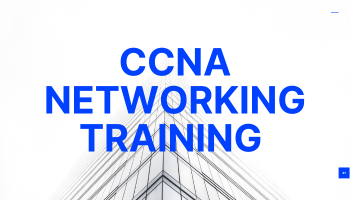Your cart is currently empty.
CCNA stands for Cisco Certified Network Associate. It is a widely recognized and respected entry-level certification in the field of networking. The CCNA certification is offered by Cisco Systems, a leading company in the networking and IT industry. Obtaining the CCNA certification validates a candidate's knowledge and skills in various networking technologies and is often considered a foundational step for individuals pursuing a career in networking or related IT fields. Cranesoft Provides the best CCNA Training in Bangalore.

Online-Classroom
3 Months Duration
Live Class Facilities
Interviews Assured
Live Server
Welcome to the exciting world of networking and the Cisco Certified Network Associate (CCNA) training! CCNA is a widely recognized certification in the field of networking, offered by Cisco Systems, a leading networking equipment and solutions provider.
CCNA Exam
Cisco introduced a consolidated CCNA exam that covers a broad range of networking topics. The consolidated CCNA exam includes networking fundamentals, IP connectivity, IP services, security fundamentals, automation, and programmability.
Exam Information/Exam Code
The specific exam code may change based on the latest updates. Refer to the official Cisco website for the current exam code.
Exam Format
The CCNA exam typically consists of multiple-choice questions, drag-and-drop items, simulations, and simlets. Exam formats may vary based on the latest updates.
Passing Score
The passing score for the CCNA exam may vary. Cisco provides this information on their official certification website.
Certification Prerequisites
There are generally no formal prerequisites for taking the CCNA exam. However, having a basic understanding of networking concepts is recommended.
Study Resources
Cisco provides official study materials, including books, online courses, and documentation. Practice exams and hands-on labs are essential for preparation.
A CCNA course should cover a broad range of networking topics, including networking fundamentals, routing and switching, WAN technologies, security, and more.
Practical experience is crucial in networking. Look for a course that provides hands-on labs or virtual labs to reinforce theoretical concepts with practical application.
Courses with experienced and certified instructors can provide valuable insights and real-world scenarios. Check the qualifications and certifications of the instructors.
Ensure that the course follows the official Cisco curriculum for CCNA to align with the certification exam objectives.
A good CCNA course should include practice exams and assessments to help students gauge their understanding and readiness for the certification exam.
Look for courses that offer flexibility in terms of learning options, such as in-person classes, virtual classrooms, or self-paced online learning.
Access to additional resources like study materials, documentation, and forums can enhance the learning experience. Check if the course provides such support.
The course should explicitly prepare students for the CCNA certification exam. This may include tips, strategies, and mock exams to simulate the real exam environment.
Some training providers offer career support services, including resume building, interview preparation, and job placement assistance.
Research the reputation of Cranesoft Solutions and the specific CCNA course by checking reviews and testimonials from past students.
Via Network Administrator,Responsible for managing and maintaining an organization's computer networks. Configuring and troubleshooting network devices such as routers, switches, and firewalls.
Via Network Engineer,Designing and implementing computer networks for organizations. Configuring and optimizing network infrastructure to ensure efficiency and security.
Via Systems Administrator,Administering and maintaining an organization's computer systems and servers. Collaborating with network administrators to ensure seamless integration.
Via IT Support Engineer,Providing technical support to end-users and resolving issues related to network connectivity and IT systems. Troubleshooting and diagnosing problems with hardware, software, and networks.
Via Security Analyst/Engineer,Focusing on the security aspects of networks. Implementing and maintaining security measures to protect against cyber threats.
Via Network Technician,Installing, configuring, and maintaining network hardware and software. Assisting in the troubleshooting of network-related issues.
Via Wireless Communications Engineer,Designing and implementing wireless networks. Configuring and optimizing wireless infrastructure for performance and security.
Via Data Center Technician,Managing and maintaining data center infrastructure. Configuring and troubleshooting network components within a data center environment.
Via Telecommunications Specialist,Working with telecommunications equipment and systems. Configuring and maintaining voice and data communication networks.
Via Cloud Support Engineer,Supporting and maintaining cloud-based infrastructure and services. Configuring and managing networks in cloud environments.
Via Field Service Technician,Traveling to client sites to install, configure, and troubleshoot network equipment. Providing on-site support for network-related issues.
Via Network Operations Center (NOC) Technician,Monitoring network performance and responding to incidents. Collaborating with other IT professionals to ensure network reliability.
Via Pre-Sales Engineer,Assisting sales teams by providing technical expertise and solutions during the pre-sales process. Understanding and addressing customer requirements.
Via IT Consultant,Offering expert advice to organizations on their IT infrastructure. Designing and implementing customized solutions based on client needs.
Via Junior Network Architect,Assisting in the design and planning of complex network architectures. Collaborating with senior architects to implement scalable and secure network solutions.